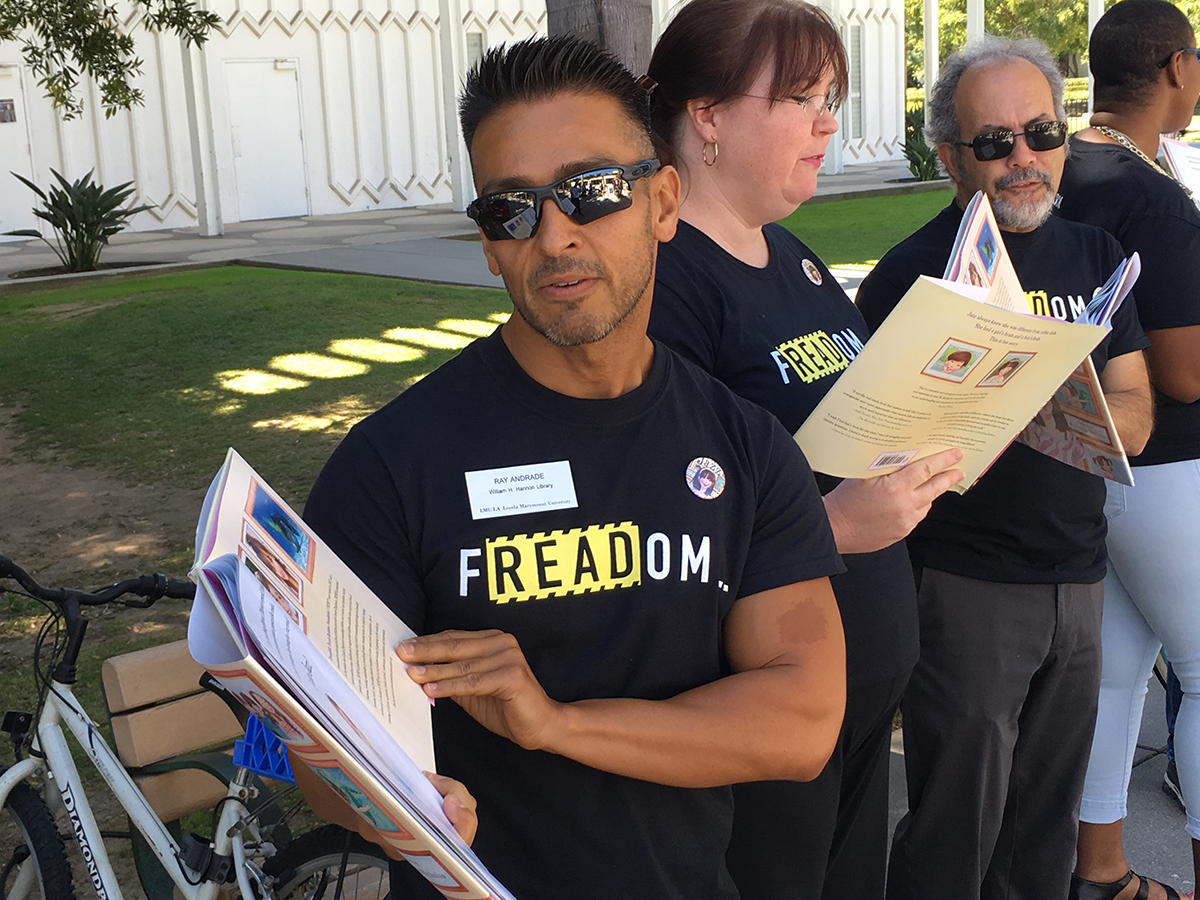
When I talk to students about Banned Books Week, I am often met with looks of incredulity. “Books are still banned?” “Not just banned,” I tell them, often pausing for dramatic effect, “challenged, banned, relocated, redacted, and restricted.” I then list an array of commonly read titles, from “The Bluest Eye” to “Harry Potter,” which only seems to deepen their disbelief. Inevitably, our conversation turns to the various social, political, and religious motivations behind book challenges in the United States, at which point the existence of book banning seems shockingly more likely. In recent years, however, the subject-matter of those challenged and banned titles have developed a common thread: anything related to LGBTQ+ experiences.
The American Library Association’s Office for Intellectual Freedom tracks the number of books that are banned or challenged each year. (Footnote: A challenge is an attempt to remove or restrict materials, based upon the objections of a person or group. A banning is the removal of those materials.) In 1982, the first “List of Books Some People Considered Dangerous” contained 404 titles. By 2021, the number of books affected by censorship attempts had risen to 1,597, more than double the year prior. As Deborah Caldwell-Stone, director of the ALA’s Office for Intellectual Freedom, notes: “This is a dangerous time for readers and the public servants who provide access to reading materials. Readers, particularly students, are losing access to critical information, and librarians and teachers are under attack for doing their jobs.”
Launched in 1982 by a coalition of librarians, booksellers, publishers, authors, teachers, and journalists, Banned Books Week is an annual celebration that honors our freedom to read and encourages everyone to fight attempts at censorship. The name is a bit of a misnomer. It is true, in the United States at least, that books are not banned outright at the federal or state level. Through a variety of commercial, public, and private sources, one could get their hands on almost any book title imaginable. However, access to certain books, especially titles covering sensitive or controversial topics, is frequently hindered or restricted at the local level of schools and libraries which for many people may be their only viable option.
LGBTQ-inclusive books, in particular, are some of the most challenged and banned titles each year. Among the 2021 top-10, most-frequently challenged books one would find “Lawn Boy” by Jonathan Evison (banned and challenged), “All Boys Aren’t Blue” by George M. Johnson (banned and challenged), “Beyond Magenta” by Susan Kuklin (banned and challenged), “Gender Queer” by Maia Kobabe (banned, challenged, and restricted), and “This Book is Gay” by Juno Dawson (banned, challenged, relocated, and restricted). In previous years, one would find notable titles such as “Melissa” by Alex Gino, “This Day in June” by Gayle E. Pitman and Kristyna Litten, “And Tango Makes Three” by Peter Parnell, Justin Richardson, and Henry Cole; “Prince & Knight” by Daniel Haack, and “I Am Jazz” by Jessica Herthel, Jazz Jennings, and Shelagh McNicholas.
In August, residents of Jamestown, Michigan, (source) voted to defund their local library rather than allow it to distribute graphic novels with LGBTQ+ themes. The librarians at Patmos Library had refused to remove the books in question (though they did move one title “behind the counter”). Accusations of “indoctrination” and “grooming” were lobbied about by residents, and persistent harassment and threats by conservative groups resulted in the resignation of both the library director and the interim director shortly after. As a result of the vote, the lack of funding from local taxes (approximately $245,000) would have meant that the library would run out of funding next year. However, through the donations of people from around the country, including a $50,000 donation from author Nora Roberts (source), the library will be able to keep its doors open.
In December 2021, Sen. Rob Standridge filed a bill in the Oklahoma Senate that “prohibits public school districts, public charter schools, and public school libraries from having or promoting books that address the study of sex, sexual preferences, sexual activity, sexual perversion, sex-based classifications, sexual identity, gender identity, or books that contain content of a sexual nature that a reasonable parent or legal guardian would want to know about or approve of before their child was exposed to it.” Although the bill did not receive a Senate floor hearing before the 2022 session deadline, it has garnered strong support from other senators.
In my professional circles as a librarian, I hear stories similar to what happened in Michigan and Oklahoma every week. Many of these stories are hyper-local and rarely reach the attention at the national level, so I was heartened when a recent conversation with Levar Burton on “The View” went viral. When asked to give his opinion on the recent banning of children’s books, he said “I’ll be absolutely candid and honest. It’s embarrassing that we are banning books in this country; in this culture; in this day and age.”
Many of the book challenges we are seeing these days are driven by parents and individuals who implore us to “think of the children!” I cannot help but think that underlying that call is a fear of anything that is not heteronormative, cisgendered, and/or white, and an inability to accept that joy can be found outside of those narrowly defined ways of experiencing the world. But as authors, librarians, and teachers continually remind us, it is essential for children to see themselves in the books they read.
“It’s very hard to hear people say ‘This book is not appropriate to young people’ when it’s like, I was a young person for whom this book would have been not only appropriate, but so, so necessary,” said Maia Kobabe, author of “Gender Queer” to NBC (source). “There are a lot of people who are questioning their gender, questioning their sexuality and having a real hard time finding honest accounts of somebody else on the same journey. There are people for whom this is vital and for whom this could maybe even be lifesaving.”
As Levar Burton said, in the closing quote from that viral video: “Read the books they’re banning. That’s where the good stuff is!”
DEI Buzz
- Visit the LGBTQIA+ community hub for events, recommended reads, resources, Zoom backgrounds, and more!
- Join the Story Circle Facilitation Training, led by our 2022 DEI Faculty Fellow, Arnab Banerji, on Oct. 20 from noon-1:30 p.m. For more information, click here.




